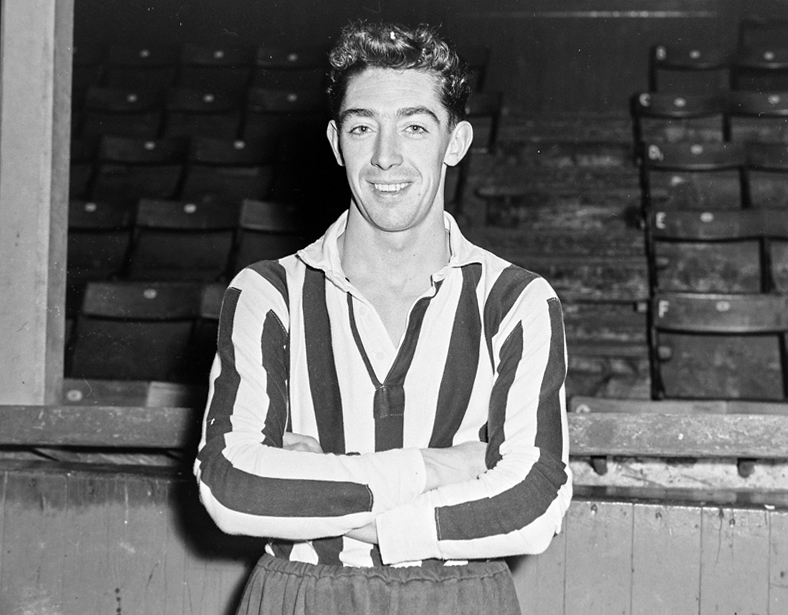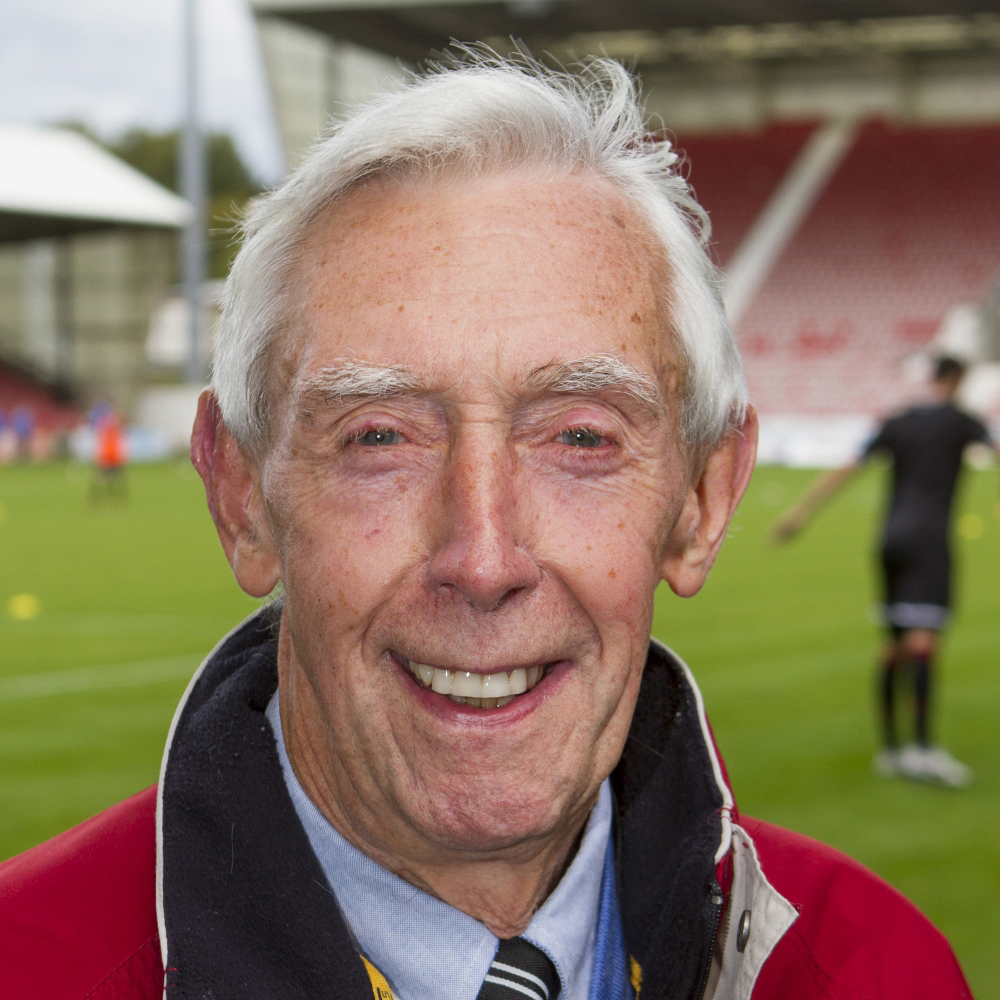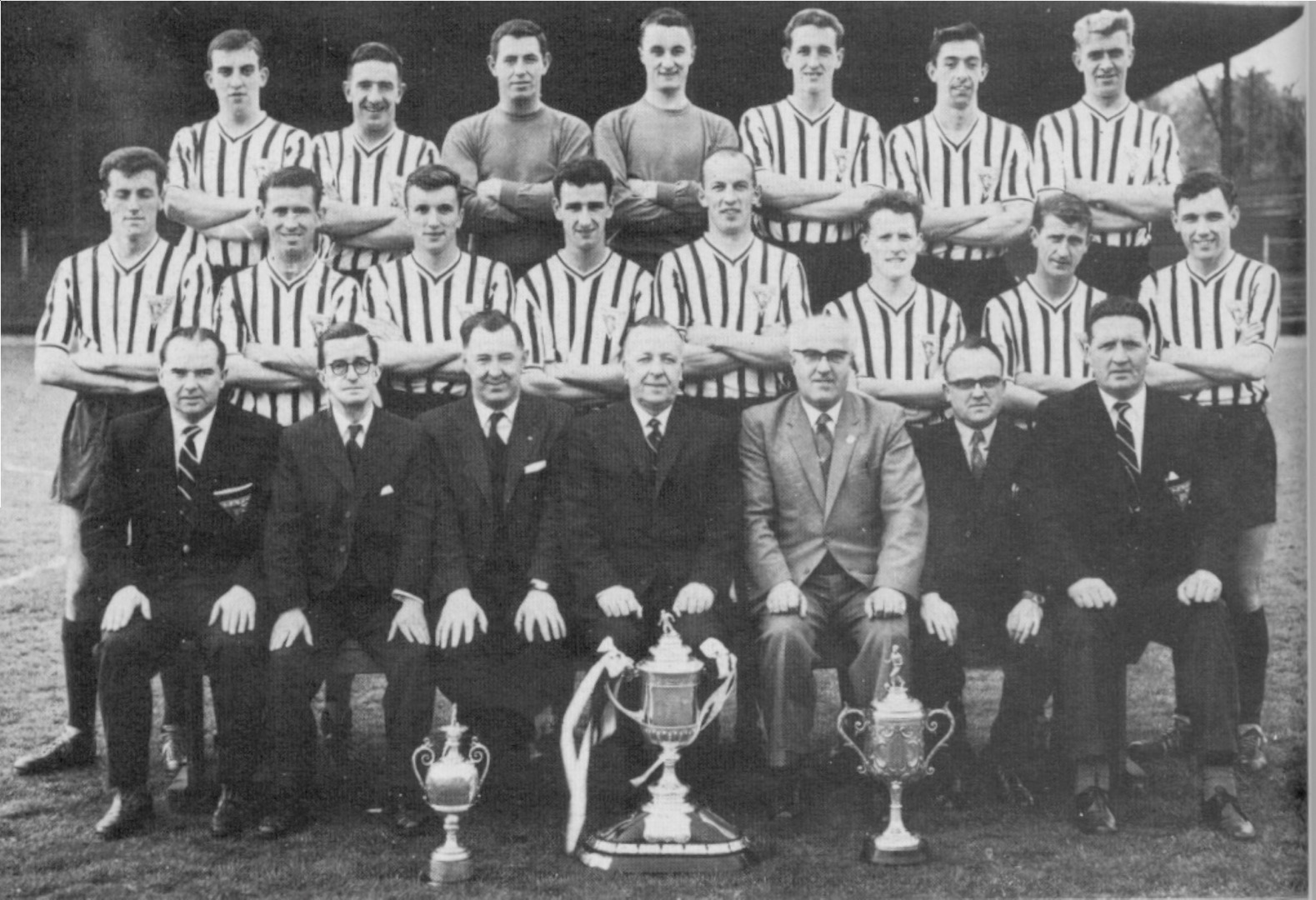News | John Sweeney
Thursday, 16th Mar 202331 October 1934 `“ 14 March 2023

The club was deeply saddened to hear that John Sweeney, one of the club`s great heroes from the 1961 Scottish Cup winning team, has passed away this week, aged 88. Not only was John possibly the oldest former Pars player, but he was also a regular match attender and a strong supporter of the Former Players Association until recently; he will be sorely missed by everyone who knew him.
In the early 1950s, new manager Bobby Ancell had the job of rebuilding the Dunfermline team on a relatively modest budget, and he succeeded by bringing in talented young players like Jimmy Millar, George O`Brien, Felix Reilly and Charlie Dickson. Another was a young Edinburgh-born full back, John Sweeney, who was signed from Edina Hearts in September 1954. The nineteen-year-old made his debut on 9th October 1954 in a Reserve League match at Dundee which finished 2-2, and he continued to learn his trade in the Reserves for the remainder of the season while the first team boys were winning promotion for the first time since the 1930s.
John may have been in contention for a first team place in the top division the following season but instead he was whisked away to do his two years of national service. As luck would have it, he was posted to Gibraltar where, by his own admission, he completed quite possibly the easiest national service imaginable.
Apart from some minor jobs looking after stores, John virtually became a full-time professional footballer, playing for the Army team and the Combined Services team, taking on local Spanish sides as well as visiting personnel. He was made captain of the Combined Services team and in one of his most prestigious tasks had the job in 1956 of introducing his players to the Duke of Edinburgh, who had stopped off at Gibraltar on his way to open the Melbourne Olympic Games in Australia.
By the start of the 1957/58 season, John was back home and keen to renew his football career at East End Park. More than three years after his original signing, John made his first team debut for the Pars on 2 November 1957. Dunfermline had struggled to maintain their early momentum and needed a result in this important match against Dundee United, and they got it, romping home to a 6-1 win. John never looked back and played in every game in Pars promotion-winning team, and was a regular in the side for the next three seasons, although he did switch from right back to become regular left back.
Then Pars manager Andy Dickson had assembled a great squad of players who were frustratingly inconsistent but who, at their best, could beat anyone. Among the games that John played during that period was the Scottish Cup match against Rangers in March 1958 when Second Division Pars almost caused an upset in front of the biggest crowd (24,377) that East End Park had seen at that time; a 1-0 win over Celtic in the league, only the second time Dunfermline had ever beaten the Glasgow giants; the 10-1 win over Partick Thistle in the final game of 1958/59 which went down in folklore to secure an unlikely reprieve from relegation; and an astonishing 6-0 win over Motherwell in the first league match on 1959/60.
Motherwell had been one of the pre-season favourites for the league title that season, while Dunfermline four days earlier had lost 6-1 to Third Lanark in the League Cup. That last game provided John with his only senior first team goal, and quite a goal it was too `“ with the Pars already 4-1 up, Sweeney took a free kick fifty yards out. As the Motherwell keeper came out, the ball sailed over his and his defence`s heads into the net!
John was also a part of the team that enjoyed the club`s first overseas trip to Switzerland in 1959, and also the team that inaugurated the East End Park floodlights against Sheffield United that same year `“ happy days indeed. However, the best was yet to come.
In March 1960, Jock Stein took over as manager and immediately had an impact. John often told the story of Stein`s first game in charge, a league match against Celtic. Before the game started, the referee was banging on the door of the Pars dressing room telling them to come out; however, Stein had it locked and wouldn`t let anyone out until the whole Celtic team were on the park to allow Pars fans to applaud their own players. Dunfermline won 3-2 and thus began a remarkable period in the club`s history.

Competition for places had seriously increased in 1960/61 with the talented youngster Cammy Fraser taking on the right back role and the experienced Irish International full back Willie Cunningham joining from Leicester City. Nonetheless, Sweeney was still very much part of Stein`s plans and he in fact played 27 times during that season. Four of those were in the early rounds of the Scottish Cup including victories against Berwick Rangers and Stranraer; a remarkable 6-3 win against Aberdeen at Pittodrie, and a 4-0 quarter-final win over Alloa Athletic.
For the semi-final against St Mirren, Stein went with the pairing of Fraser and Cunningham and kept to that for the Final against Celtic. However, the first tie was drawn and when centre half Jackie Williamson was injured and unable to make the replay on 26 April 1961, Stein had no hesitation in drafting in John Sweeney `“ not to his usual full-back role, but to left half to replace George Miller who moved to centre half. It was a piece of tactical genius `“ Sweeney nullified the threat of Celtic playmaker Willie Fernie, Eddie Connachan made some remarkable saves and Davie Thomson and Charlie Dickson scored the goals to send Dunfermline and everyone in it into a night of unprecedented celebrations.
As Stein moved to create a full-time team at Dunfermline, John Sweeney became one of the casualties. John had always been part-time, combining football with his job as a joiner. By 1962 John had started his own joinery business and declined the offer to go full-time and left professional football for good. Dunfermline had been his one and only team, but he`d had quite a swansong. In all John made 134 first team appearances, a total that would surely have been exceeded in different circumstances.

After leaving the game, John initially made a number of appearances in charity matches, notably for the `˜Scotland All Stars` who played a motley crew of Radio 1 DJs at Meadowbank! Later, he got more into golf where he and his wife Wilma became mainstays at Turnhouse Golf Club in Edinburgh for many years.
John`s son Stephen told us this week that his father was obsessed with football right to the end:-
`Even on Monday, when he was very ill, he wanted to know the draw for the Scottish Cup semi-finals! I think what he loved most of all was the camaraderie he got from football. One of his happiest days in recent times was when Dunfermline reached the Scottish Cup Final in 2004 `“ all the old team were there and he loved the crack and the laughs.
`He used to talk about Dunfermline`s win in the Cup in 1961 at Aberdeen. The team went back in the same train as the supporters, and he said he`d had such a brilliant time singing and drinking with the fans.`
`He also used to be great friends with the Rangers captain John Greig and I couldn`t work out how that had come about until he told me that the two of them used to meet with other players at Waverley Station and had a cup of tea before they all headed off on their respected trains to whatever games they were playing in!`
We`ll leave the last words to the man himself, who when speaking at a function at East End Park in 2009 said this:-
`I enjoyed my playing days with the Pars immensely and look back on those days with great affection. We all enjoyed playing the game back then.`
Thanks for all the fun you gave us John. RIP.
John is survived by his three children Stephen, Mark and Joanne and his six grandchildren `“ our thoughts are with the family at this sad time. The funeral will take place on Wednesday 29 March at 11.00am at St Kentigern`s Church, Barnton, Edinburgh.
views: 3,975
